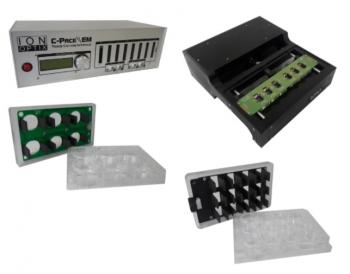Culture Pacing System
Culture Pacing System is a multi-mode, multi-channel system for mechanical stretching and electrical stimulation of tissue and cells.
- Overview
- Specifications
- References
- Links
KEY FEATURES
- Patented method for electrically stimulating cultured cells
- C-Stretch delivers both mechanical stretching and electrical stimulation simultaneously.
- Using user-friendly software, stimulation protocols can be changed
- Exercise programs, program arrhythmic stimulation, and erratic pacing
The new IonOptix Culture Pacing System is a multi-mode, multi-channel device that can stretch tissue and stimulate stem cells mechanically or electrically. It can be used in conjunction with C-Stretch to simultaneously stretch and stimulate, or it can be used with C-Dish electrode assemblies and conventional culture dishes to only stimulate electrically.
The Culture Pacing System makes use of electrostimulation, and electromechanical stimulation in culture combined with mechanical stretch provides a potent tool to boost maturation of naive cell lines. Chronic electrical stimulation has also been shown to avoid cardiomyocyte dedifferentiation and preserve their rod-shaped, striated morphology.
Pacing will keep the myocyte's rod-shaped, striated form for several days. While most chronically paced tests last 72 hours with little loss of contraction amplitude, quiescent cells lose their ability to contract after 6 to 18 hours. Cells are retained in a normal nitrogen balance for at least 72 hours, and protein synthesis is also sustained. Studies have seen effects last up to 7 days.
The Culture Pacing System/C-Dish system often achieves 70–80% capture in a decent adult rat myocyte preparation (however some researchers believe that just employing enough voltage to stimulate 50–60% of the cells provides the benefits of pre-selection and best survival of the healthiest cells). By using the method, investigations that last many days are made possible, and the quantity of cells that may be used from every animal is increased.
The instrument was used in these investigations:
- Heat shock protein upregulation protects against pacing-induced myolysis in HL-1 atrial myocytes and in human atrial fibrillation.
Brundel, B. J., Henning, R. H., Ke, L., Gelder, I. C., Crijns, H. J., & Kampinga, H. H.
(2006). Journal of Molecular and Cellular Cardiology, 41(3), 555-562. - Contractile C2C12 myotube model for studying exercise-inducible responses in skeletal muscle.
Nedachi, T., Fujita, H., & Kanzaki, M.
(2008). American Journal of Physiology-Endocrinology and Metabolism, 295(5). - Accelerated de novo sarcomere assembly by electric pulse stimulation in C2C12 myotubes.
Fujita, H., Nedachi, T., & Kanzaki, M.
(2007). Experimental Cell Research, 313(9), 1853-1865.
You can also visit site of the manufacturer.


